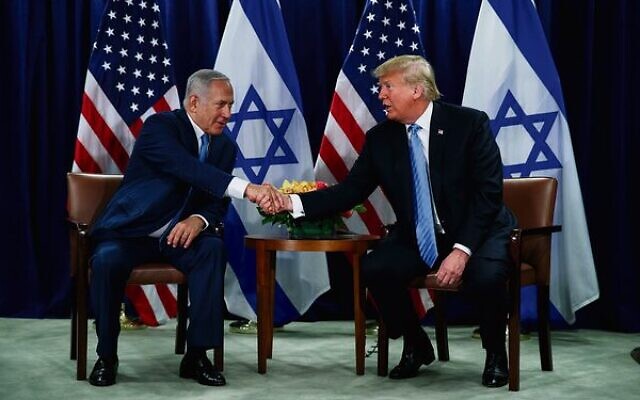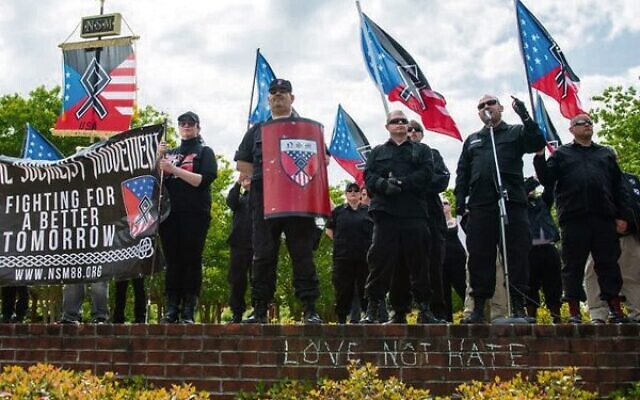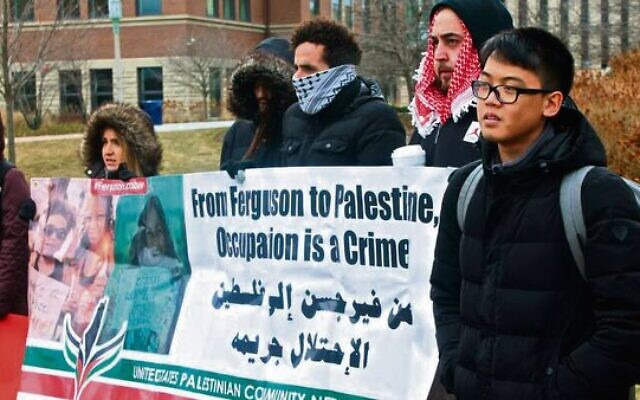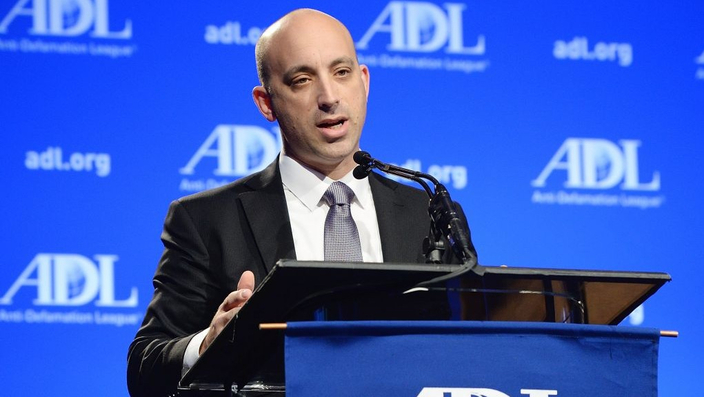Jonathan Greenblatt: First, I’ll just say how excited I am to come to Australia. I was there 11 or 12 years ago on a lecture tour. I’m so looking forward to coming back. I have so much respect for the Australian Jewish community. To come with JNF is really a treat too, because JNF is such an amazing organisation doing such great work in Israel.
Q There seems to be more polarisation than ever before in America. The Jewish community always gets caught in the middle. What has brought this about and what can be done?
Around the world we are seeing a kind of mega trend of populism and polarisation. There has been a broad pushback on the perceived elites. Our two-party system, while [it was] envisioned by the founding fathers as a way to ensure a degree of parity, the reality is the system itself is really paralysed by a kind of polarisation.
There are different things driving it. Special interests are driving it to a degree. Social media to a large extent is fanning the flames and feeding it. In the past, our news media I think saw it had a role and a responsibility to help mediate information in a responsible manner. Today, when the arbiters are the algorithms of Google and Facebook and whatnot, that sense of social obligation is gone. The other trend is the have and have-nots gap, which has grown considerably.
And unfortunately, I think what’s worrisome is the impact on the Jewish community. Because when systems fail, people look for someone to blame. And in an environment where scapegoats thrive, Jews are typically the first target.
Q The other aspect is to the far right, we’re not white. And to the far left, we’re privileged whites. What is your take on that?
Let’s acknowledge race is a kind of cultural construct. We’re all part of the human race. And yet, the Nazi genocide of European Jewry was predicated on the idea that we were a race, just not a human race. So to the far right, even though we might look white, that’s part of why they hate us because they think we can blend into their society and their communities. And then, of course, to the radical left, despite the fact that if you look at Israel, in many communities, Jews are not “white”, I mean, my wife who’s an Iranian Jew, definitely doesn’t look like you or me. And to suggest that somehow because she is Jewish, that she’s white, or that her own lived experience as a refugee, as a person of colour doesn’t count, is crazy. And so Jews find themselves in this kind of space in between, where we’re not enough for either side.

Photo: AP Photo/Evan Vucci/File
Q Let’s talk about the Trump years in terms of the emboldening of the far right. But also, there’s that conflict in that he also did a lot of good for Israel. How do you marry that?
Trump came to office as the president with the closest relationship to the Jewish people we had ever seen. This man had Jewish grandchildren. This man had a Jewish son-in-law and daughter who had offices in the West Wing. That was unprecedented. He recognised Jerusalem as the capital of Israel. The propaganda of the Palestinian Authority that questions the authenticity of the Jewish experience in Eretz Yisrael, Trump called it out and cut off money to UNRWA when they refused to change their textbooks. It was under his watch that the Abraham Accords happened.
But he started his campaign disparaging other minorities and soon was tweeting out antisemitic memes that literally were cut and pasted from white supremacist chat rooms. How do I know that? Because we saw them on white supremacist chat rooms. He was using the kind of language in his speeches that was borrowed from virulent, vicious antisemites.
The sum total of it was to enable extremists to enter the political conversation in ways that had not happened before … the kind of white supremacist whose literally whole raison d’etre is to harm Jewish people. And he gave them the kind of entree they’d never had before. So this is complicated and difficult to explain.
Q What problems does the rise of the extreme right present?
This is deeply worrisome for us as the American Jewish community. We know how things have worked out in other places where the extreme right has grown. You see it in parts of Europe. You see people like [Hungarian President] Viktor Orban, he uses the kind of conspiratorial antisemitic tropes and lies that we find so worrisome, like his slander against George Soros … the idea that he is pulling the strings of some global conspiracy to undermine Hungary is right out of the Protocols of the Elders of Zion.
We’ve been tracking extremist candidates for office, we’re tracking well over 100. Most of the primaries have already happened and I think more than 25 per cent of these extremists made it through. These are QAnon supporters, white supremacists. Some of them are radical left-wing antisemites. It’s crazy to think how the political norms in America are changing literally as we speak.

Photo: AFP Photo/Bita Honarvar
Q In Australia, there are many who refuse to acknowledge that antisemitism even exists on the left side of the political spectrum. I know on US campuses, anti-Zionism crosses the line into antisemitism. How big a problem is it and what can be done?
I would just say right up front antisemitism is a problem however and wherever it shows up. Let’s not be confused, the far right is as anti-Zionist as anyone else. These people deride the State of Israel at every opportunity. So let’s just be clear about that fact.
What I would say is where the far right will say things like “the Jewish people don’t belong”, “the Jewish people are illegitimate” … on the radical left, they say “the Jewish State doesn’t belong”, “the Jewish State is illegitimate”. So you could almost do a search and replace. It’s the same myths, it’s the same lies. I was recently asked at a conference: “Why does the ADL conflate anti-Zionism with antisemitism?” And I responded, “we actually don’t, anti-Zionism is antisemitism”.
This stuff isn’t new. Like the extreme right has been propagandising against the Jewish State for years, so has the radical left. A lot of the anti-Zionism rhetoric wasn’t developed in Berkeley, California, it was developed in the former Soviet Union. The “Zionism is racism” concept, the concept of Jewish supremacy – [KKK leader] David Duke doesn’t get the credit for that, neither does Omar Barghouti and the BDS movement. It came out of the KGB disinformation campaigns from the 1950s.
To draw an analogy, the antisemitism of the extreme right is like a tsunami. You know it’s coming … the wave is going to come and destroy everyone in its path. The antisemitism of the radical left is more like climate change. It starts slowly and some people don’t see it. Some people deny it. Some people dismiss it. And it grows and it grows and suddenly the temperature is up here.
Many people on the left have not taken this sufficiently seriously, they have allowed the pseudo-intellectual arguments about Israel to blind them from the reality that anti-Zionism is not a philosophy or idea that’s based on equality or justice for Palestinians, it’s based on negating the inherent rights of the Jewish people that they would accord to everyone else. It’s pernicious and sinister. So I worry a great deal about this antisemitism from the left that’s often steeped in this kind of political milieu, when in reality, it’s as racist and as toxic as the antisemitism from the extreme right.
Q But the big issue, especially on campus, is well-meaning people who care about human rights are being deceived. How do we fight that?
It’s up to us to educate them on what Zionism is, it is up to us to educate them on why this is so combustible, so dangerous. It’s up to us to educate them about what’s really at stake. We’ve got no choice but to knuckle down and prosecute this fight because Jewish lives are really on the line. In the US last May around the fighting in Gaza, we had a huge spike in antisemitism. And most of the perpetrators weren’t wearing MAGA hats, they were wearing keffiyehs. And that wasn’t just the US, that was in Canada. That was in the UK. That was in Germany. That was in France, that was in Belgium. So this is a global phenomenon.
By the way, today, I saw from one of my analysts a post in a nasty anti-Israel group, one of the calls they’re trying to spread and make popular is “globalise the intifada”. The intifada was about the intentional murder of Israeli civilians. It was about suicide bombs in discotheques, at Passover seders, on public buses. Calling for globalising the intifada is as disgusting and repulsive as if someone were to say globalise the bombing of Kyiv and murder all Ukrainians wherever they may be. But somehow when the anti-Israel crowd does it, there’s this unwillingness to call it out for what it is – raw, ugly chauvinism. It should be shunned by decent people, irrespective of your faith or your nationality or your political persuasion.
Q What are some lessons from the US that we can apply in Australia?
Number one, you have to push back on antisemitism wherever and whenever it happens, particularly when the ideas come from people you know, on your own side, if you will. And I learned this from Natan Sharansky. When conservatives express antisemitism, conservatives need to call it out. When liberals express it, liberals need to call it out. Neither side of the political spectrum is exempt, and those of us who are in this fight, have an obligation to call it out in an objective and clear and consistent fashion. That’s number one.
Number two, I think all of us have to sort of dial down the drama. Respond with facts, not with hysteria. Focus on the truth. And another idea in the Jewish faith is teshuvah, right? We all sin. So when someone errs, if they apologise in an authentic way accept their apology, embrace the sinner, welcome them into your home. We’re all in this together.
And number three, it’s important for democracies all over the world, democracy is not a spectator sport. You’ve got to get on the field – we all have a role to play. You can come work for the ADL, you can write a cheque, you can volunteer, but all of us have a role to play if we want to sustain these liberal democracies, which I would argue have been the best form of governments for the Jewish people in 2000 years of living in exile. We as Jews need to recognise the gift of liberal democracy and do our utmost to not just preserve it, but to improve it, to strengthen it for the next generation.

Q Lastly, a controversial question: What do you say to critics in America who say the ADL has become “woke”?
I can send you an op-ed from today that says ADL is too conservative. And I can send you an op-ed that says the ADL is too liberal. That ADL is too focused on the Jews, that ADL is focused not enough on the Jews. We get criticism from both sides in equal amounts.
That being said, when ADL was founded in 1913, it could have been founded just to defend the Jewish people. That’s not what our founders wrote. And Hillel could have said, “If I am not for myself, who will be” and he could have ended it there. But he didn’t. So when I’ve stood up for black Americans, or for immigrants, or for the LGBTQ population, it’s been fundamental to the integrity of this organisation for well over a century.
You also need solidarity, to work in partnership with other communities. Because if [you’re] half a per cent of the population [in Australia] or in America a little less than two per cent, we just can’t do it on our own. So part of why we do this work is because morally we are obligated to do it as a result of our traditions. Part of why we do this work is because strategically we are impelled to do it because of our organisation’s mission. Partly why I do this work, is because practically, it’s sound and smart to do it.
I don’t really care what the critics say. If I spent my time just obsessing about what the right says or the left says about the ADL, I would never get any work done. But I’m proud of what this organisation has accomplished long before I got here, and I’m excited about where we’re going.
Jonathan Greenblatt will be the keynote speaker at JNF Australia’s annual events in Sydney, Melbourne and Perth. Enquiries/bookings: jnf.org.au/events


comments